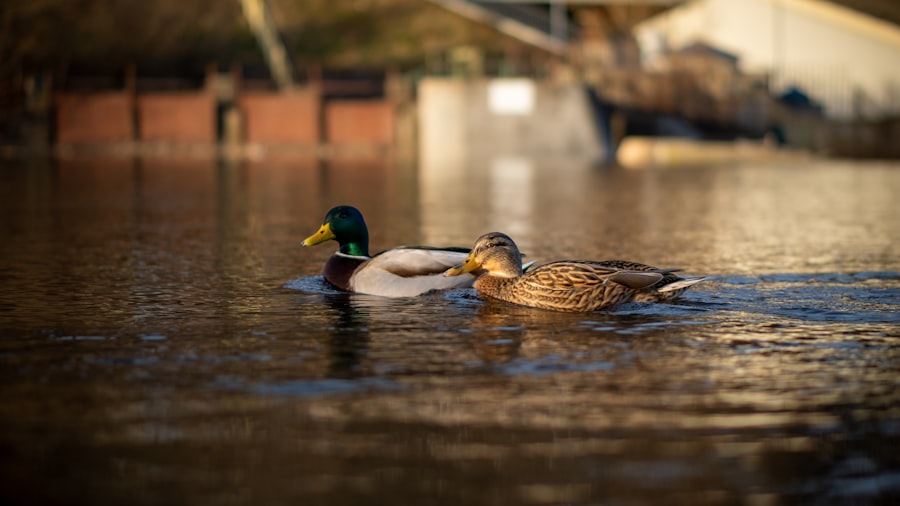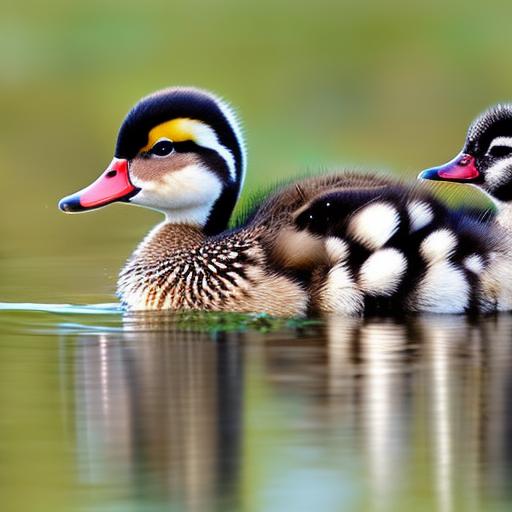Duck breeds come in a wide variety, each with its own unique characteristics and traits. From the popular Pekin duck to the beautiful Mallard, there are many options to choose from when it comes to raising ducklings. It is important to choose the right breed based on your specific needs and preferences. Whether you are looking for a pet or planning to raise ducks for farming or agriculture purposes, selecting the right breed is crucial for their growth and development.
Key Takeaways
- Ducklings come in a variety of breeds, each with their own unique characteristics and needs.
- The adorable appearance of ducklings makes them a popular choice for farming, agriculture, and as pets.
- Choosing the right breed is important for ensuring the health and well-being of your ducklings.
- Popular duck breeds as ducklings include Pekin, Muscovy, and Khaki Campbell.
- Proper care for ducklings includes providing a warm and safe environment, a balanced diet, and regular veterinary check-ups.
The Adorable Appearance of Ducklings
One of the main reasons why ducklings are so popular is their adorable appearance. With their fluffy feathers, round bodies, and tiny beaks, they are undeniably cute. Ducklings have a charm that is hard to resist, making them a favorite among pet owners and animal enthusiasts. Their small size and playful nature make them even more endearing.
The Importance of Choosing the Right Breed
Choosing the right breed of ducklings is essential for their overall well-being and success in their environment. There are several factors to consider when selecting a breed, such as their size, temperament, and purpose. Some breeds are better suited for egg production, while others are known for their meat quality. It is important to research and understand the specific needs and characteristics of each breed before making a decision.
The breed you choose will also affect the growth and development of your ducklings. Different breeds have different growth rates and dietary requirements. Some breeds may require more space or specific environmental conditions to thrive. By selecting the right breed, you can ensure that your ducklings have the best chance of reaching their full potential.
The Characteristics of Popular Duck Breeds as Ducklings
There are several popular duck breeds that are commonly raised as ducklings. Each breed has its own unique characteristics and traits that make them stand out.
The Pekin duck is one of the most popular breeds for both meat and egg production. They are known for their large size, white feathers, and calm temperament. Pekin ducklings are fast-growing and have a high feed conversion rate, making them ideal for meat production.
The Mallard is another popular breed that is often seen in ponds and lakes. They have beautiful green heads, brown bodies, and are known for their ability to fly. Mallard ducklings are hardy and adaptable, making them a great choice for those looking to raise ducks in a natural environment.
Other popular duck breeds include the Muscovy, Rouen, and Khaki Campbell. Muscovy ducklings have unique red faces and are known for their meat quality. Rouen ducklings resemble wild Mallards but are larger in size. Khaki Campbell ducklings are excellent egg layers and have a friendly disposition.
Understanding the Unique Needs of Ducklings
Ducklings have specific needs that must be met in order for them to thrive. Providing the right environment, nutrition, and care is essential for their growth and development.
Ducklings require a clean and safe living space with access to water for swimming and drinking. They also need a balanced diet that includes a mix of commercial duck feed, fresh greens, and clean water. It is important to provide them with proper nutrition to support their growth and ensure they receive all the necessary vitamins and minerals.
In addition to their physical needs, ducklings also require social interaction and mental stimulation. They are social animals that thrive in the company of other ducks or even other animals. Providing them with companionship and opportunities for play can help prevent boredom and promote their overall well-being.
The Best Ways to Care for Ducklings

Caring for ducklings requires attention to detail and a commitment to meeting their specific needs. Here are some tips for providing the best care for your ducklings:
1. Feeding and watering: Ducklings should be fed a balanced diet that includes a mix of commercial duck feed, fresh greens, and clean water. It is important to provide them with fresh food and water daily and ensure that their feeders and waterers are clean and accessible.
2. Keeping them warm and dry: Ducklings are sensitive to temperature changes and need to be kept warm and dry. Provide them with a heat source, such as a heat lamp or brooder, to maintain a temperature of around 90-95 degrees Fahrenheit for the first few weeks. Make sure their bedding is clean and dry to prevent any health issues.
3. Providing a safe environment: Ducklings need a safe and secure environment to grow and thrive. Make sure their living space is predator-proof and free from any hazards. Provide them with access to water for swimming and drinking, as well as plenty of space to move around.
The Challenges of Raising Ducklings
Raising ducklings can come with its own set of challenges. It is important to be prepared for these challenges and know how to overcome them.
One common challenge faced by duckling owners is the risk of disease and infection. Ducklings are susceptible to various diseases, such as duck viral enteritis and botulism. It is important to practice good hygiene, provide clean living conditions, and monitor their health closely to prevent the spread of disease.
Another challenge is providing the right balance of nutrition. Ducklings have specific dietary requirements that must be met for their growth and development. It is important to provide them with a balanced diet that includes the right mix of nutrients, vitamins, and minerals.
The Benefits of Raising Ducklings for Farming and Agriculture
Raising ducklings can be beneficial for farming and agriculture purposes in several ways. Ducks are known for their ability to control pests, such as insects and snails, in agricultural fields. They can help reduce the need for chemical pesticides and provide a natural and sustainable solution for pest control.
Ducklings can also be raised for meat production. Certain breeds, such as the Pekin duck, are known for their meat quality and fast growth rate. Raising ducks for meat can be a profitable venture for farmers and provide a sustainable source of protein.
In addition, ducklings can be raised for egg production. Breeds like the Khaki Campbell are excellent egg layers and can provide a consistent supply of fresh eggs. Duck eggs are known for their rich flavor and nutritional value, making them a popular choice among consumers.
The Role of Ducklings in Conservation Efforts
Ducklings can play a role in conservation efforts by helping to restore and maintain natural habitats. Ducks are important for wetland ecosystems as they help control vegetation growth, disperse seeds, and provide food for other animals. By raising ducklings and releasing them into suitable habitats, conservation programs can help restore and preserve these ecosystems.
One example of a conservation program involving ducklings is the reintroduction of endangered species into their native habitats. By breeding and raising endangered duck species in captivity, conservationists can increase their population numbers and release them back into the wild. This helps to ensure the survival of these species and maintain biodiversity.
The Joy of Raising Ducklings as Pets
Raising ducklings as pets can bring immense joy and fulfillment. Many people find great pleasure in watching them grow from cute little fluff balls into beautiful adult ducks. Ducklings are social animals that form strong bonds with their owners and can provide companionship and entertainment.
Ducklings are also known for their playful nature and amusing antics. They love to swim, explore, and interact with their environment. Watching them splash around in water or waddle around the yard can be a source of endless amusement.
In conclusion, raising ducklings can be a rewarding and fulfilling experience. Whether you choose to raise them as pets or for farming and agriculture purposes, selecting the right breed is crucial for their growth and development. Ducklings have specific needs that must be met in order for them to thrive, including a balanced diet, a safe environment, and social interaction. Despite the challenges that may arise, the joy and benefits of raising ducklings far outweigh the difficulties. Consider raising ducklings and discover the joy they can bring to your life.
If you’re interested in raising ducklings, you might also want to check out this informative article on Poultry Wizard about different duck breeds. From adorable Pekin ducklings to the elegant Runner ducks, there are various breeds to choose from depending on your preferences and needs. Discover the characteristics and traits of each breed and find the perfect fit for your flock. To learn more about duck breeds, click here: https://poultrywizard.com/keeping-ducks/duck-breeds/.
FAQs
What are duck breeds?
Duck breeds refer to the different types of ducks that exist, each with unique physical and behavioral characteristics.
How many duck breeds are there?
There are over 100 different duck breeds recognized by the American Poultry Association.
What are some common duck breeds?
Some common duck breeds include Pekin, Muscovy, Rouen, Khaki Campbell, and Mallard.
What is the difference between male and female ducklings?
Male ducklings, or drakes, typically have brighter and more colorful feathers than female ducklings, or hens. Drakes also tend to be larger in size and have a curled feather on their tail.
What should I feed my ducklings?
Ducklings should be fed a diet of starter feed specifically formulated for ducks, which contains the necessary nutrients for their growth and development. They can also be given small amounts of fresh fruits and vegetables as treats.
How do I care for my ducklings?
Ducklings require a clean and warm environment, with access to fresh water and food at all times. They should also be provided with a safe and secure space to sleep and play. Regular cleaning and monitoring of their health is also important.
When do ducklings start to lay eggs?
Ducklings typically start laying eggs at around 5-6 months of age, depending on the breed and individual development.
Meet Walter, the feathered-friend fanatic of Florida! Nestled in the sunshine state, Walter struts through life with his feathered companions, clucking his way to happiness. With a coop that’s fancier than a five-star hotel, he’s the Don Juan of the chicken world. When he’s not teaching his hens to do the cha-cha, you’ll find him in a heated debate with his prized rooster, Sir Clucks-a-Lot. Walter’s poultry passion is no yolk; he’s the sunny-side-up guy you never knew you needed in your flock of friends!







